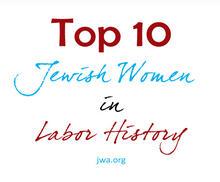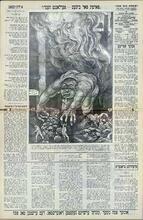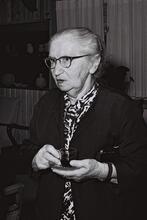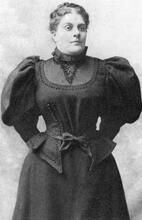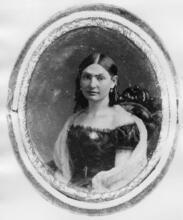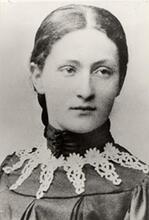Hortense Powdermaker
Anthropologist Hortense Powdermaker used her experiences of anti-Semitism and “passing” to offer new insights into how societies manage tensions between insiders and outsiders. She graduated in 1919 from Goucher College, where she was active in labor organizing. In 1925 she moved to England, where she earned her PhD in 1928 and did her first field study on a fishing village on the island of New Ireland, publishing Life in Lesu in 1933. She then returned to the US, where she “passed” as Methodist while researching the community of Indianola, Mississippi. The resulting book, 1939’s After Freedom, was a watershed in studying race relations. In addition to publishing other books and papers, she also taught and served as vice president of the New York Academy of Sciences and the president of the American Ethnological Society.
In her memoir, aptly entitled Stranger and Friend: The Way of an Anthropologist (1968), Hortense Powdermaker explored the balance of involvement and detachment necessary for participant-observer fieldwork in cultural anthropology, stressing the ability to “step in and out of society.” Her secular Jewish identity was apparently a factor in learning this skill, exemplified in an academic career that included thirty years of college teaching and the writing of five major books based on widely diverse fieldwork studies. Her choice of projects and her writing reflected a concern for social equality, which at times stretched her commitment to impartiality.
Early Life
The daughter of Louis and Minnie (Jacoby) Powdermaker, she was part of the second generation of her family to be born in the United States. Except for her English Jewish maternal grandmother, relatives on both sides were of German Jewish ancestry. Both grandfathers were prosperous businessmen in Philadelphia, where Hortense Powdermaker was born on December 24, 1896, the second of four children. Their father was also in business, sometimes more and sometimes less successfully. Her older sister Florence Powdermaker became a well-known psychiatrist. She also had a younger brother and sister. The family moved to Reading, Pennsylvania, when Hortense was five, and to Baltimore seven or eight years later.
Stranger and Friend touches only briefly on Powdermaker’s Jewish identity. Although her maternal grandfather was president of a Reform synagogue in Pennsylvania and she was confirmed in Baltimore, she reports not sensing “much religious feeling” in the family. As a teenager she rebelled against what she called the boring “Americanized business culture” of her relatives, criticizing their attachment to material things, their concern with subtle class distinctions within the family, and their negative view of more recent Jewish immigrants from Eastern Europe. Later, she sought out acquaintances among Eastern European Jews, appreciating their sense of cultural roots and their socialist ideology.
Education and Early Career
Powdermaker’s first personal encounter with antisemitism came as a day student at Goucher College, when she was not invited to join a sorority because she was Jewish. In the 1930s, she found it necessary to “pass” as a Methodist while doing fieldwork in a small Mississippi town, but she also contacted the Jewish community in a larger town nearby.
At Goucher, Powdermaker was an enthusiastic history major interested in socialism and the labor movement. She worked one spring vacation as a machine laborer in a shirt factory, then became active in the Women’s Trade Union League. After graduating in 1919, she was employed for several years as a labor organizer for the Amalgamated Clothing Workers in New York, Cleveland, and Rochester. Conscious of her role as a middle-class outsider, she kept a detailed diary, precursor to the field notes that would later form the basis for her anthropological work.
Moving to England in 1925, Powdermaker began studying anthropology with the noted Polish-born scholar Bronislaw Malinowski at the London School of Economics. Profoundly influenced by his teaching, she lived in Bloomsbury and was active in his small circle of graduate students. She earned her Ph.D. in 1928, then spent ten months in the southwest Pacific, studying firsthand the social structure of a small coastal fishing village on the island of New Ireland, in what is now Papua New Guinea. Her first book, Life in Lesu, appeared in 1933.
Career and Research
Between 1930 and 1937, Powdermaker was associated with the Institute of Human Relations at Yale University, where her interest in psychological anthropology was encouraged by its director Edward Sapir. During 1932–1934 she lived in the small town of Indianola, Mississippi, carrying out one of the earliest participant-observer community studies in the Deep South. Her book After Freedom (1939) was a pioneering work on United States race relations, praised for its portrayal of the black church, of cultural and class diversity within the African-American community, and of cultural patterns and psychological attitudes among both blacks and whites.
In 1944, she wrote a book for high school students, Probing Our Prejudices, an anthropological and psychological discussion of the causes and dynamics of racism, antisemitism, and discrimination against immigrants in the United States. It was infused with her commitment to tolerance, which she saw as inherent to American democracy, in contrast to the tyrannies of Nazism.
A devotion to democratic ideals was also reflected in her next fieldwork site—Hollywood—where she studied the social structure of the film industry and its effect on the content of contemporary films. Though she aimed to achieve an impartial view of various components of the industry, her popular book Hollywood, the Dream Factory (1950) criticized screenwriters, management, and what she called the “totalitarianism” pervading Hollywood culture, with its “concept of man as a passive creature to be manipulated.” In retrospect, she criticized her methodology during this study, regretting that she had allowed her own values to dominate her research.
In her last major fieldwork project (1953–1954), Powdermaker continued to study mass communication, examining the interaction of media and social change among copper miners in Northern Rhodesia (now Zambia). Her book Copper Town appeared in 1962.
From 1938 to 1968, Powdermaker taught anthropology at Queens College in New York, where she was made full professor in 1954, received the Distinguished Teacher Award in 1965, and retired as professor emeritus. While teaching at Queens, she also lectured at the William Alanson White Institute of Psychiatry, Psychoanalysis, and Psychology (1944–1952); the New York College of Medicine (1958); and, during World War II, at Yale, in an Army Specialized Training Program for the South Pacific. She was vice president of the New York Academy of Sciences (1944–1946) and vice president (1945–1946) and president (1946–1947) of the American Ethnological Society. In 1957, Goucher College awarded her an honorary doctorate of science.
Powdermaker spent the last two years of her life in California. She had begun research on the youth culture of Berkeley, when she died of a heart attack on June 15, 1970.
Hortense Powdermaker had close relations with many colleagues and students, and lived for a number of years with a foster son, Won Mo Kim. Perhaps her most enduring legacy is her final book Stranger and Friend. It is a candid account of her fieldwork in terms of her cultural background and psychological makeup (informed by psychoanalysis), including her multiple roles as a woman stepping in and out of diverse societies. The first book of its kind, it came at a time when anthropology was emphasizing “scientific method” rather than the humanistic and reflexive approach she exemplified. From the 1990s perspective of social scientists telling their own stories and acknowledging their cultural position in relation to their subjects, her work can be seen as groundbreaking.
Selected Works
Powdermaker, Hortense, Brackette F. Williams, and Drexel G. Woodson. After Freedom: A Cultural Study in the Deep South. New Directions in Anthropological Writing. Madison: University of Wisconsin Press, 1993.
Powdermaker, Hortense. “The Channeling of Negro Aggression by the Cultural Process.” American Journal of Sociology 48, no. 6 (1943): 122-130.
Powdermaker, Hortense. Copper Town: Changing Africa; the Human Situation on the Rhodesian Copperbelt. Harper & Row, 1962.
Powdermaker, Hortense. “Fieldwork.” International Encyclopedia of the Social Sciences, edited by David L. Sills. Vol. 5 (1968): 418–424;
Powdermaker, Hortense. “From the Diary of a Girl Organizer.” The Amalgamated Illustrated Almanac. New York: Amalgamated Clothing Workers of America, Education Department, 1924.
Powdermaker, Hortense. Hollywood, the Dream Factory: An Anthropologist Looks at the Movie-Makers. Little, Brown, 1950.
Powdermaker, Hortense. Life in Lesu: The Study of a Melanesian Society in New Ireland. The Norton Library. New York: Norton, 1933.
Powdermaker, Hortense. Probing Our Prejudices, a Unit for High School Students. Harper & Row, 1944.
Powdermaker, Hortense. Stranger and Friend: The Way of an Anthropologist. New York: Norton & Company, 1967.
Current Biography Yearbook (1961): 372–373.
DAB 8.
NAW modern.
Obituary. NYTimes, June 17, 1970, 47:3.
“Powdermaker, Hortense.” In Notable Maryland Women, edited by Winifred G. Helmes (1977): 285–289.
Trager, George L. “Hortense Powdermaker: A Tribute.” American Anthropologist 73 (1971): 786–787.
Wolf, Eric R. “Obituaries: Hortense Powdermaker.” American Anthropologist 73 (1971): 783–786.
WWWIA 5.



